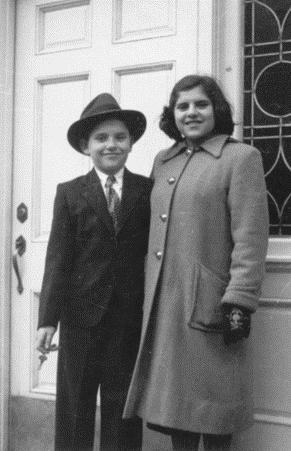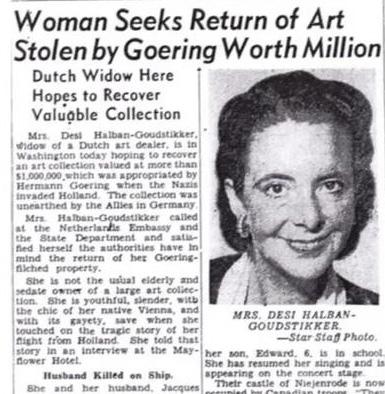
4 minute read
Consequences of War and Violence
Everyone was so excited for the arrival of Philip and Evaline Krant’s first born, on May 20, 1938. They had a very large and close extended family and the joy that their daughter Dientje brought to the family was palpable. The couple lived in Bussum, Holland.
Diny (Dientje)was very active and rambunctious and she loved living above the store where her father and uncle worked. It was very close to the village center and with her aunt and uncle living next door , there was never a shortage of love and laughter. Diny recalls licking the frosting from a bowl her aunt handed her from their shared balcony and laughing with her and her mother while they cooked in the kitchen. All seemed wonderful.
On May 4, 1940, Holland was occupied by the Nazis and life for all was changed. Philip, trying to keep his family safe, placed Diny in a children’s home, passing Diny off as a Christian child. If Diny had been a quiet child, this might have worked, but she was so excited about her next birthday when she “would be given her yellow star” that the plan had to change. By 1942, the school behind their home was occupied by the Nazis. One day Diny could not be found. Suddenly, they noticed Diny marching behind a group of soldiers with a pot on her head. Her parents quickly understood that it was time to go into hiding.
Philip managed to find only separate places for his family through a mixture of charm, business smarts, and luck. Diny kept the beloved doll “Anneka Pop” as she moved into a house in Laren, Holland, with “Maatje and Paatje,” endearing names for grandparents. They were a caring, sweet, older couple who worked hard to pretend to be Diny’s grandparents, even taking photos with her in a photo studio.
However, the situation took a frightening turn and Diny had to leave. The family had been betrayed. An individual who “helped” Philip find a hiding place, was a traitor. This “traitor” was making money by telling the Nazis where Jewish people were hiding. The family had moved 7 times over four years and these memories haunted Diny for decades: being alone and being thrown out of a moving train. Once she was thrown from the train car, Diny recalls a group of nuns collecting bits of coal on the side of train tracks scooping her up and taking her to “safety.” Now, Diny was in the care of a Catholic woman named Doortje Van Kloppenberg. She spent the majority of her time locked in a very small closet with her “Anneka Pop” doll and a commode bowl. Occasionally, she was allowed to go to church with Doortje. One midnight mass, as she was walking with Doortje, they came upon a drunken Nazi, beating a man on a tree. Frightened by what she saw, Diny began screaming and crying. This Nazi directed his brutality to Diny and kicked her in the stomach. Soon violence became worse for Diny and Doortje’s brother became involved. His mental cruelty turned to sexual abuse. In May 5, 1945, when Diny was almost 7 years old, Holland was liberated from Nazi rule, but Diny was changed! She was sure that her parents were dead and took solace in the only thing she knew, her Catholic faith.
Surprisingly, Diny was ultimately reunited with her parents who were found by a sister-in-law. About 20% of the Krant family survived. Despite reunification with her parents, Diny had drastically changed from a very outgoing happy child to a traumatized child, who felt isolated and
terrorized. The experiences of her young life continues to affect Diny. Her parents adopted an orphan, daughter Roos, and had another child, a son Jacob, who was born after the war. But neither parent had recovered from the physical and mental tragedies of the war and a “normal” family life was not possible. In 1955, Diny left Holland and found work with Holland America. She worked as a nanny and traveled all over the world, with EVALINE stops in Canada and California. Returning DELSON to Europe, Diny met Leonard Kalisky in Germany when they were both “stood up” by blind dates. Leonard noted Diny’s Star of David necklace, and then pulled his out and announced, “I’m Jewish, too.” They married in 1963 and moved to Kingstree, South Carolina, where Leonard was raised, then to Charleston. In 1967 they had their first born, a son, Karol, followed by two daughters, Evaline and Phillis. PHILLIS MAIR Despite Diny’s desire to work outside of the home, her mental health struggles endured and in 1979, the family moved to Holland to help Diny receive mental health treatment at the hospital Centrum 45 in Oegstgeest, a specific facility for Holocaust Survivors. They returned to Charleston in 1981. Diny met Roscoe Adkins in September, 1988 and married in 2002. Sadly, he passed away in 2007. War and violence had taken a devastating toll on all involved. ■

Evaline Krant with baby Diny; Philip and Evaline with Diny as a toddler in Holland.
Diny Krant with her beloved doll Anneka Pop in 1942.


Evaline Delson, the owner of Delson Chiropractic and Phillis Mair, an artist and office manager of Delson Chiropractic are the daughters of Diny Kalisky Adkins.










